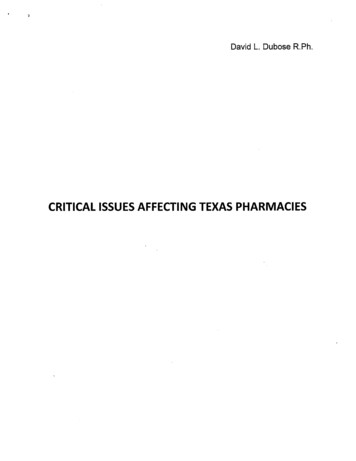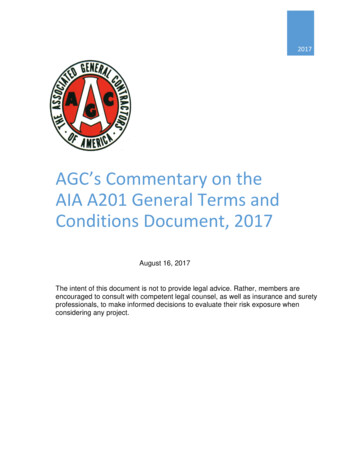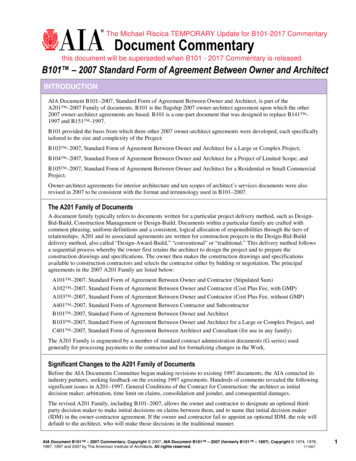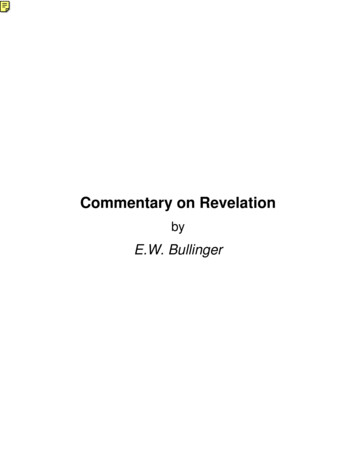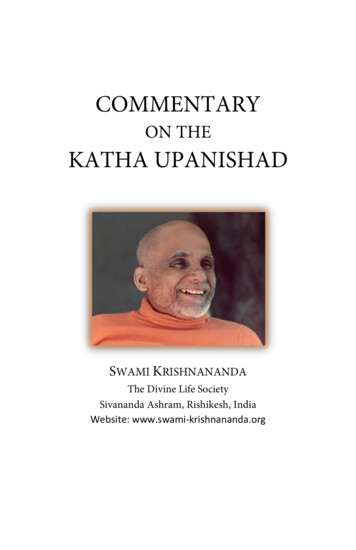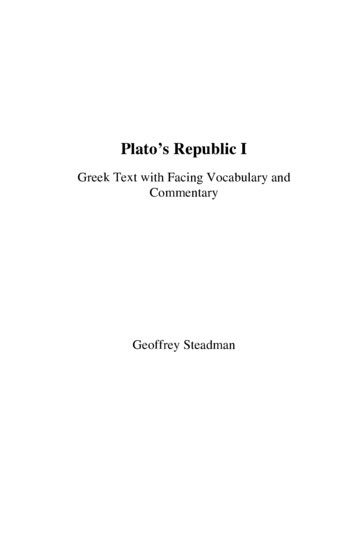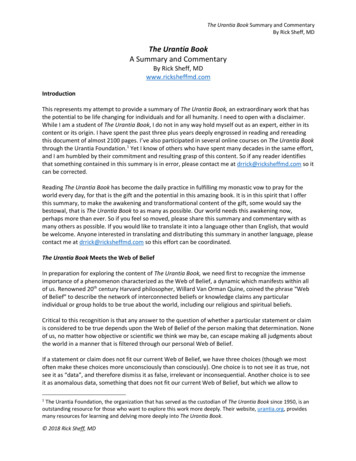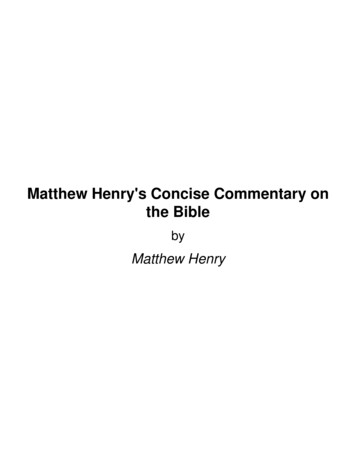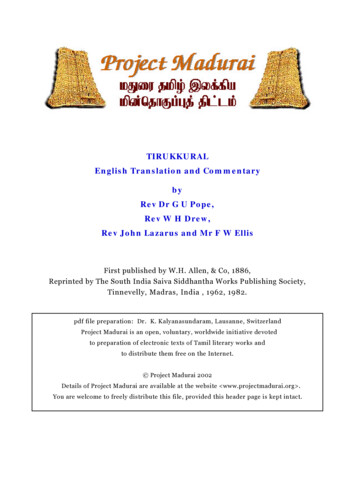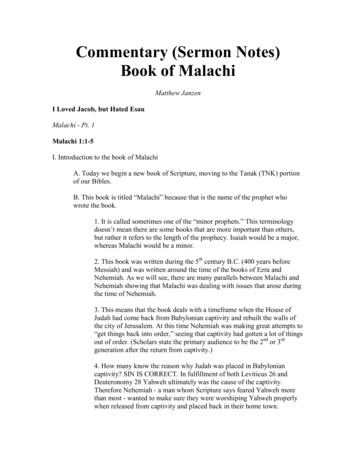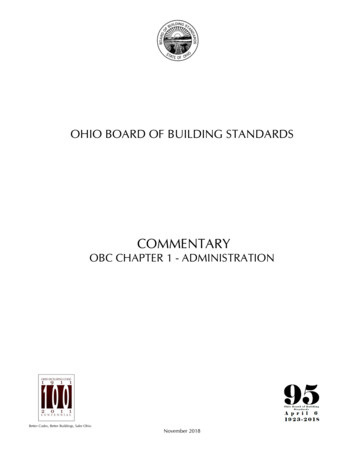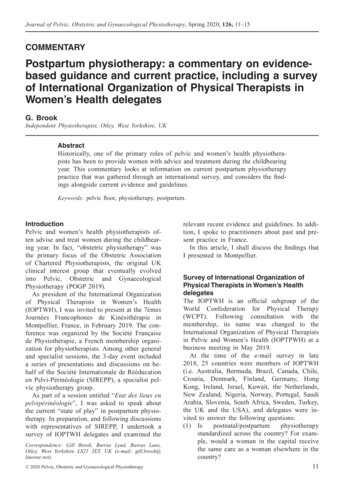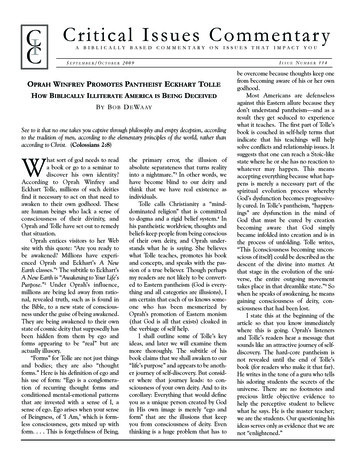
Transcription
CI Critical Issues Commentar BER 2009OPRAH WINFREY PROMOTES PANTHEIST ECKHART TOLLEHOW BIBLICALLY ILLITERATE AMERICA IS BEING DECEIVEDB Y B O B D E W A AYSee to it that no one takes you captive through philosophy and empty deception, accordingto the tradition of men, according to the elementary principles of the world, rather thanaccording to Christ. (Colossians 2:8)What sort of god needs to reada book or go to a seminar todiscover his own identity?According to Oprah Winfrey andEckhart Tolle, millions of such deitiesfind it necessary to act on that need toawaken to their own godhood. Theseare human beings who lack a sense ofconsciousness of their divinity, andOprah and Tolle have set out to remedythat situation.Oprah entices visitors to her Website with this quote: “Are you ready tobe awakened? Millions have experienced Oprah and Eckhart’s A NewEarth classes.”1 The subtitle to Eckhart’sA New Earth is “Awakening to Your Life’sPurpose.”2 Under Oprah’s influence,millions are being led away from rational, revealed truth, such as is found inthe Bible, to a new state of consciousness under the guise of being awakened.They are being awakened to their ownstate of cosmic deity that supposedly hasbeen hidden from them by ego andforms appearing to be “real” but areactually illusory.“Forms” for Tolle are not just thingsand bodies; they are also “thoughtforms.” Here is his definition of ego andhis use of form: “Ego is a conglomeration of recurring thought forms andconditioned mental-emotional patternsthat are invested with a sense of I, asense of ego. Ego arises when your senseof Beingness, of ‘I Am,’ which is formless consciousness, gets mixed up withform. . . . This is forgetfulness of Being,the primary error, the illusion ofabsolute separateness that turns realityinto a nightmare.”3 In other words, wehave become blind to our deity andthink that we have real existence asindividuals.Tolle calls Christianity a “minddominated religion” that is committedto dogma and a rigid belief system.4 Inhis pantheistic worldview, thoughts andbeliefs keep people from being consciousof their own deity, and Oprah understands what he is saying. She believeswhat Tolle teaches, promotes his bookand concepts, and speaks with the passion of a true believer. Though perhapsmy readers are not likely to be converted to Eastern pantheism (God is everything and all categories are illusions), Iam certain that each of us knows someone who has been mesmerized byOprah’s promotion of Eastern monism(that God is all that exists) cloaked inthe verbiage of self help.I shall outline some of Tolle’s keyideas, and later we will examine themmore thoroughly. The subtitle of hisbook claims that we shall awaken to our“life’s purpose” and appears to be another journey of self-discovery. But consider where that journey leads: to consciousness of your own deity. And to itscorollary: Everything that would defineyou as a unique person created by Godin His own image is merely “ego andform” that are the illusions that keepyou from consciousness of deity. Eventhinking is a huge problem that has toTHATIMPACTYOUISSUE NUMBER 114be overcome because thoughts keep onefrom becoming aware of his or her owngodhood.Most Americans are defenselessagainst this Eastern allure because theydon’t understand pantheism—and as aresult they get seduced to experiencewhat it teaches. The first part of Tolle’sbook is couched in self-help terms thatindicate that his teachings will helpsolve conflicts and relationship issues. Itsuggests that one can reach a Stoic-likestate where he or she has no reaction towhatever may happen. This meansaccepting everything because what happens is merely a necessary part of thespiritual evolution process wherebyGod’s dysfunction becomes progressively cured. In Tolle’s pantheism, “happenings” are dysfunction in the mind ofGod that must be cured by creationbecoming aware that God simplybecame infolded into creation and is inthe process of unfolding. Tolle writes,“This [consciousness becoming unconscious of itself] could be described as thedescent of the divine into matter. Atthat stage in the evolution of the universe, the entire outgoing movementtakes place in that dreamlike state.”5 Sowhen he speaks of awakening, he meansgaining consciousness of deity, consciousness that had been lost.I state this at the beginning of thearticle so that you know immediatelywhere this is going. Oprah’s listenersand Tolle’s readers hear a message thatsounds like an attractive journey of selfdiscovery. The hard-core pantheism isnot revealed until the end of Tolle’sbook (for readers who make it that far).He writes in the tone of a guru who tellshis adoring students the secrets of theuniverse. There are no footnotes andprecious little objective evidence tohelp the perceptive student to believewhat he says. He is the master teacher;we are the students. Our questioning hisideas serves only as evidence that we arenot “enlightened.”
SEPTEMBER/OCTOBER 2009I will unpack the key ideas found inThe New Earth so you understand whatit means and be equipped to warn yourfriends and family, pointing theminstead to the gospel of Jesus Christ.INSANITY IN THE MIND OF GODThe key question for pantheists is this:If God is all there is, and nothing existsoutside of God, then why the apparentexistence of everything else? Why allthe wickedness and evil? The answer inHinduism is maya—illusion that makescategories seem real. Tolle calls this “ourinherited dysfunction” and describes theHindu idea: “Certain teachings at theheart of Hinduism perhaps come closestto seeing this dysfunction as a form ofcollective mental illness. They call itmaya, the veil of delusion.”6 He repeatsthis idea here: “Recognize the ego forwhat it is: a collective dysfunction, theinsanity of the human mind.”7 But forpantheists like Tolle, the human mind isillusion; God is all there is, so the insanity is ultimately in God’s mind.As he is wont to do, Tolle interpretsthe Buddhist idea of dukkha and theChristian idea of sin along the lines ofinherited dysfunction, making majorreligions say the same thing. He nevermentions that Christianity’s concept ofsin is not insanity in the mind of God,but our rebellion against God’s law.Whenever Tolle speaks of the “collective human dysfunction” he means theillusion that we actually exist as distinctbeings with individual identities. Forexample, in a section where he teaches“nonreaction to the ego of others” hewrites: “But you can only be in a state ofnonreaction if you can recognize someone’s behavior as coming from the ego,as being an expression of the collectivehuman dysfunction.”8 Of course, if, inmy true essence I am deity and theother person is too, then any battlebetween us would be our unrealthoughts and forms in conflict. If wehad both achieved consciousness (ofdeity) we would have no conflict. Hewrites, “When the ego is at war, knowthat it is no more than an illusion that isfighting to survive.”9When Tolle speaks of “collective2disease” or “collective dysfunction” beadvised that he is speaking of what happened to God when He was infoldedinto creation and lost consciousness ofhis own existence, and thus a dreamlikestate ensued. So “human dysfunction” ismerely a manifestation of God’s insanitybeing progressively cured by spiritualevolution. He says, “the collective disease of humanity is that people are soengrossed in what happens, so hypnotized by the world of fluctuating forms,so absorbed in the content of their lives,they have forgotten the essence, thatwhich is beyond content, beyond form,beyond thought.”10 Consider this:Object consciousness needs to bebalanced by space consciousnessfor sanity to return to our planetand for humanity to fulfill its destiny. The arising of space consciousness is the next stage in theevolution of humanity.11What does he mean by “space consciousness”? It is another term for beingawakened to our own divinity. As longas we are only conscious of the world offorms and thoughts, we are in an unrealdreamlike state from which we mustawake. When awake, we become “spaceconscious”: “You are trapped in objectconsciousness, unaware of the timelessinner space of consciousness itself.”12“Awakening” is the achievement of consciousness, which Tolle’s book hopes tohelp us obtain. Consciousness is awareness of our own divinity.CONSCIOUSNESS OF SELF-DEITYSince the problem of all of creation isthe lack of consciousness of being God,the solution is to gain consciousness ofself-deity. In Tolle, the state of everyunenlightened person is “unconscious.”The first step is to realize we are unconscious, living in a dream-like state thatwe consider to be real: “When you realize the unconsciousness in you, thatwhich makes the recognition possible isthe arising of consciousness, is awakening.”13 So where do we get this consciousness? Tolle says: “The light of consciousness is all that is necessary. YouISSUE NUMBER 114are that light.”14 Why look elsewhere forlight when you are the light and merelyhave failed to be conscious of it? In thefollowing citation Tolle is forthright indeclaring the deity of humans:When forms around you die ordeath approaches, your sense ofBeingness, of I Am, is freed fromentanglement with form: Spirit isreleased from its imprisonmentin matter. You realize your essential identity as formless, as an allpervasive Presence, of Beingprior to all forms, all identifications. You realize your true identity as consciousness itself, ratherthan what consciousness hadidentified with. That’s the peaceof God. The ultimate truth ofwho you are is not I am this or Iam that, but I Am.15He had cited the apostle Paul about thepeace of God and implies that Paul hadthe same idea as Tolle, which is absurd.But, when he speaks using capitalizedterms such as “Being,” “Presence” or “IAM,” he means “God.” Later heexplains why: “We could say ‘God’ if theword had not been so misused. I preferto call it Being.”16 In reading his book,such capitalized terms (there are otherssuch as “Now” and “Source”) could bereplaced by “deity” and the meaningwould not change. In fact, to help keepmy thoughts about his book straight,when I found those terms I wrote“deity” in the margin to remind myselfof what he means. We are the “I Am”but just do not know it. That is theproblem to be solved. Finding one’s trueessence as “Being” (deity) is the essenceof salvation in the Oprah/Tolle schemeof things.I find it interesting that RickWarren has sold millions of books underthe guise of helping people to find theirpurpose. His is a watered down“Christian” version of a journey of selfdiscovery.17 Though Warren’s version isa compromised gospel, it does maintainthe distinction between the creatureand the Creator. Tolle has a pantheisticversion of self-discovery that has nosuch distinction: “There is no substitute
SEPTEMBER/OCTOBER 2009for finding true purpose. . . It [your primary purpose] does not concern whatyou do but what you are—that is to say,your state of consciousness.”18 So whatis our “inner purpose”? Tolle’s answer:“Your inner purpose is to awaken. It is assimple as that.”19The theme of Tolle’s book is toawaken to our purpose, but what doesthat mean? He explains: “Awakening isa shift in consciousness in which thinking and awareness separate.”20Throughout his book Tolle sees thinking as problematic and part of whatkeeps us in a dream-like state thatassumes what we know and experienceabout ourselves in the real world is actually real, rather than maya or illusion.Awareness is a shift in consciousnessthat goes beyond thinking and actuallyleaves it behind: “Awareness takes overfrom thinking.”21 What is awareness? –“Awareness is conscious connectionwith universal intelligence. Anotherword for it is Presence: consciousnesswithout thought.”22 For Tolle, if wethink about the concept that we are onewith the universe and part of universalconsciousness (i.e. deity), that is notgood. We would still be thinking, andthe problematic ego (personal identity)would merely be asserting itself in a newway; reason is an enemy. So how does ithappen? “Only the first awakening, thefirst glimpse of consciousness withoutthought, happens by grace, withoutdoing on your part. . . . For some people,the reading of this book will initiate theawakening process.”23To those who understand the Biblewell and have a Biblical worldview, thismaterial appears to be absurd, and thatis exactly what it is. But in Tolle’s way ofthinking we are trapped in the egoworld of forms and thinking (we’d call itobjectivity and reason). For examplewhen Tolle says that awakening musthappen by grace, how can it be so whenthere is no transcendent God who created the world out of nothing, butrather somehow got Himself infoldedinto creation with no consciousness ofHis own existence? Who exactly confersgrace upon whom? If we are deity andunconscious of it, then from whencecomes saving grace? Does it come from3our own unenlightened consciousnesses? How does Tolle’s book confer grace?There are no answers.But sadly we live in an age ofBiblical illiteracy, and subjectivism isthe rule. That means that millions aremesmerized by Oprah and Tolle andnever think to ask critical questions. Bydemonizing the thought process, Tolleinsures that people will not challengehis ideas. Obviously he has ideas thatcome from his thoughts, and he wrote abook.Getting back to finding our purposeand discovering self deity, Tolle has ananswer: “Opening yourself to theemerging consciousness and bringing itslight into this world then becomes theprimary purpose of your life.”24 So whatis it that we know once we find consciousness and light? How do we knowwithout engaging in thinking (whichwould be self-defeating because thinking is the enemy of consciousness)?Tolle answers two questions about this:“What is the mind of God?Consciousness. What does it mean toknow the mind of God? To be aware.”25Suppose someone became consciousand was aware of Presence, Being, and IAm. Tolle tells us how that fits into thegreat scheme of things: “Fulfilling yourprimary purpose is laying the foundationfor a new reality, a new earth. Once thatfoundation is there, your external purpose becomes charged with spiritualpower because your aims and intentionswill be one with the evolutionaryimpulse of the universe.”26 All suchenlightened ones are helping theprocess of spiritual evolution. The resthinder it. Such awareness of Being issalvation in this pantheistic system. Atleast it is a good start in the salvationprocess. But be mindful of this: ultimately salvation is God being deliveredfrom his own insanity, which createdthe need for this process.The ambiguity of this philosophy isfrustrating. It is not based on anythingobservable in the real world. In fact,what we call the “real world” is theworld of forms and ego that is unreal inTolle’s way of thinking. Finding selfidentity is problematic, even with all hisdiscussion of awakening and conscious-ISSUE NUMBER 114ness. For example:You can add a thousand moredefinitions (thoughts) of whoyou are and by doing so will certainly increase the complexity ofthe experience of yourself, but inthis way, you will never end upwith the subject, the experiencerwho is prior to all experience butwithout whom there would be noexperience. So who is the experiencer? You are. And who areyou? Consciousness. And what isconsciousness? This questioncannot be answered.27It seems to me that reading Tolle is likebeing a disciple sitting under a Zen master who teaches absurdities with whichthe disciple must wrestle under the fearof being deemed “unenlightened.” Hesays, “The subject, the I, the knowerwithout which nothing could be known,perceived, thought or felt, must remainforever unknowable. This is because theI has no form.”28Okay, let’s contemplate that. I am tobecome conscious of my own deity, butwhat that means in terms of definitionsand ideas is unknowable. I must betotally unenlightened because to me adeity that has lost consciousness of hisown identity cannot be much of a deity.Why does anyone think this makessense? Perhaps it is because we haveabandoned the Bible which is rationaland consistent and thus “escaped fromreason” as Francis Schaeffer warned.Tolle returns to the theme of selfdeity: “Only forms can be known, andyet without the formless dimension, theworld of form could not be. It is theluminous space in which the world arises and subsides. That space is the lifethat I Am. It is timeless. I Am timeless,eternal.”29 This idea of our own deityapart from any objective evidence ofsuch is the epitome of blind faith. All ofthe evidence points to the fact thathumans are finite and fallen. By any definition of the term deity (such as noncontingent self existence) we fail. Butaccording to Tolle, all the evidence thatwe are finite, troubled beings, desperately needing divine intervention from
SEPTEMBER/OCTOBER 2009outside ourselves, must be considered“illusion.” He writes, “Your memoriesare invested with a sense of self, andyour story becomes who you perceiveyourself to be. This ‘little me’ is an illusion that obscures your true identity astimeless and formless Presence [i.e.deity].”30 We are not to believe theobjective evidence, but rather that Tolleis a guru who can show us to way toawakening to our purpose.Tolle claims that Jesus taught thesame thing he does. Here is how he doesthat: “When Jesus said, ‘deny thyself,’what he meant was: Negate (and thusundo) the illusion of the self. If theself—ego—were truly who I am, itwould be absurd to deny it.”31 The Biblenowhere claims that the self is an illusion. Tolle wishes to put Eastern pantheism on the lips of Jesus, who taughtno such thing. But his readers andOprah’s listeners are likely so biblicallyilliterate they have no way of knowingthat. Here is Tolle’s conclusion of hisown twisting of Jesus’ meaning: “Theonly thing that ultimately matters isthis: Can I sense my essential Beingness,the I Am, in the background of my lifeat all times? To be more accurate, can Isense that I Am that I Am at thismoment?”32 To make it clear that hespeaks of self-deity, in the next paragraph he speaks of “Being, the Source,God.”33 So to deny self as Jesus taught isto deny the false “self” of being a finitehuman being, a created being accountable to God the Creator, and to embracethe true “self” which is Being, I Am(i.e., God).EMERGENCE AND SPIRITUALEVOLUTIONSo far we have discussed human beingsas deemed to be extensions of deity whohave lost consciousness of the fact andneed to be awakened. But we have toconsider the rest of the cosmos. Sinceall categories are maya (illusion), nonhuman creation also is caught up in theprocess of God having been infoldedand having lost consciousness and theprocess of unfolding, which means theemergence of consciousness. SomeEmergent Church leaders such as Rob4Bell and Brian McLaren have boughtinto this idea which they gleaned frompantheist Ken Wilber and his idea of“the great nest of being” which isgleaned from “the great chain ofbeing.”34 The idea is that deity has lostconsciousness of itself but is nevertheless present in all things. Evolution isSpirit manifesting itself in emerging levels of complexity.35 What Tolle calls “thedescent of divine into matter”36 createsthe need for emergence from that stateor cosmic evolution.So deity is not found only inhumans, but in all things. Writes Tolle,“Once there is a certain degree ofPresence, of still and alert attention inhuman beings’ perceptions, they cansense the divine life essence, the oneindwelling consciousness or spirit inevery creature, every life-form, recognize it as one with their own essence,and so love it as themselves.”37 Not onlyis the divine essence to be found inother sentient creatures, but also inflowers and even minerals: “So whenyou are alert and contemplate a flower,crystal, or bird without naming it mentally, it becomes a window for you intothe formless. There is an inner opening,however slight, into the realm of thespirit.”38 Everything is included in emergence, or spiritual evolution. Tolle says,“Any life-form in any realm—mineral,vegetable, animal or human—can besaid to undergo ‘enlightenment.’”39These he says are temporary manifestations of the one Consciousness (i.e.,God).Jesus Himself is conscripted to teachpantheistic evolution:Like the Taoist of ancient China,Jesus likes to draw our attentionto nature because he sees apower at work in it that humanshave lost touch with. It is thecreative power of the universe.Jesus goes on to say that if Godclothes simple flowers in suchbeauty, how much more will Godclothe you. That is to say, thatwhile nature is a beautifulexpression of the evolutionaryimpulse of the universe, whenhumans become aligned with theISSUE NUMBER 114intelligence that underlies it,they will express the sameimpulse on a higher more wondrous level.40It is obvious to those who understandthe Bible that Jesus taught no suchthing. But how many people who watchOprah and read Eckhart Tolle knowthat? Our society is biblically illiterate,and being such is open to anything thatcomes cloaked in spirituality—evenEastern monism (that all reality is ofone divine essence).The spiritual evolution of whichTolle speaks means that some peoplewill be higher on the evolutionary scaleand become conscious while the unenlightened ones remain unconscious.Here is how Tolle explains it:As the new consciousnessemerges, some people will feelcalled to form groups that reflectthe enlightened consciousness . . Enlightened collectives will fulfill an important function in thearising of the new consciousness.Just as egoic collectives [elsewhere explained is groups likechurches with rigid beliefs] pullyou into unconsciousness andsuffering, the enlightened collective can be a vortex for consciousness that will acceleratethe planetary shift.41The concept of emergence is based onthe idea that God somehow got infoldedinto apparent (but illusory) forms ofexistence. In that state there is a loss ofconsciousness of deity. Emergence (orspiritual evolution) is the process ofGod emerging from that state andincludes all forms of existence in theuniverse. So even rocks evolve: “Andyet some rocks undergo a change intheir molecular structure, turn intocrystals, and become transparent to thelight.”42 This is expressed in the conceptof the great chain of Being.How this works for us is mainly sowe gain consciousness and thereby participate in the process. Since the universe is, as Ken Wilber says, spirit atplay, we can trust the processes of the
SEPTEMBER/OCTOBER 2009universe to carry us along if we let go ofour egos and addiction to forms. WhileChristians consider the created universeimpersonal, those who are enlightenedalong the lines of Tolle and Oprahunderstand it differently. Tolle says,“One thing we do know: Life will giveyou whatever experience is most helpfulfor the evolution of your consciousness.How do you know this is the experienceyou need? Because this is the experienceyou are having.”43 We are no longer tomake moral judgments about good andevil, but to trust that the spiritual evolution of the universe is bringing usalong to a better state of consciousness.THE “PAIN-BODY” ANDINTERCONNECTEDNESSA common theme in neo-paganism isthe transpersonal soul and interconnectedness of all things.44 Tolle’s pantheism has the same theme. In his casehe posits the existence of a “pain-body”which is something like karma. He says:Strictly speaking, you don’tthink: Thinking happens to you . . The voice in the head has alife of its own. Most people are atthe mercy of that voice; they arepossessed by thought, by themind. And since the mind is conditioned by the past, you areforced to reenact the past againand again. The Eastern term forthis is karma.45Tolle explains that we have been “mindpossessed” and a false self (ego) hasdeveloped that is identified with themind and thinking (which is a badthing). The emotions are also a dimension of the ego and they are problematic as well. Then there is the “pain-body”that connects us to all the negativevibrations of the human race. Our problems are not just ours, but those of theunconscious human race who wentbefore us. Tolle describes the “painbody” in its individual manifestation:[double indent] The remnants ofpain left behind by every strongnegative emotion that is not fully5faced, accepted, and then let goof join together to form an energy field that that lives in the verycells of your body. It consists notjust of childhood pain, but alsopainful emotions that wereadded to it later in adolescenceand during your adult life, muchof it created by the voice of theego [i.e. thinking]. It is the emotional pain that is your unavoidable companion when a falsesense of self is the basis of yourlife.46Keep in mind that the “false sense ofself” is the belief that we have a unique,independent existence, that our personal identities are meaningful, and thatour unique identities can be definedobjectively. The true self is consciousness of Presence, I Am, Now, and otherways of describing deity. It appears tome that Tolle’s pain-body idea is areplacement for the biblical idea of sin.Our problem is not that we haverebelled against the unique creator Godwho has given us His moral law, but thatwe have allowed our thoughts, emotions, and addiction to forms to defineus and keep us from becoming conscious (i.e., aware of our deity).In this scheme of things, there isalso interconnectivity or collectivekarma:The pain-body, however, is notjust individual in nature. It alsopartakes of the pain suffered bycountless humans throughoutthe history of humanity, which isa history of continuous tribalwarfare, of enslavement, pillage,rape, torture, and other forms ofviolence. This pain still lives inthe collective psyche of humanity and is being added to on adaily basis.47So this “pain-body” is a huge problem,endemic to the human race, and thecause of the many problems weencounter. The solution for Tolle, ofcourse, is to realize that it is illusion,escape from thought that attaches us toego, and awaken to our real identity as IISSUE NUMBER 114Am.Christ has a role in helping us withthis problem of pain-body suffering:Why is the suffering body ofChrist, his face distorted inagony and his body bleeding fromcountless wounds, such a significant image in the collective consciousness of humanity? Millionsof people, particularly inmedieval times, would not haverelated to it as deeply as they didif something within themselveshad not resonated with it, if theyhad not unconsciously recognized it as an outer representation of their own inner reality—the pain-body. . . . Christ can beseen as the archetypal human,embodying both the pain and thepossibility of transcendence.48Tolle introduces the idea of Christ, andcites Jesus often as a teacher of the newconsciousness. But he makes no effortto actually understand what the Bibletells us about the person and work ofChrist. Christ came to die for sins, notto embody pain and possible transcendence. God’s wrath is directed againstsin. That wrath is satisfied for believersby the once-for-all shed blood thatChrist offered. The new consciousness“Christ” that Tolle describes is not theChrist of the Bible. We do not need tomerely identify with Christ as the onesuffering pain, but to repent and believethe gospel. But that idea will not be presented by Oprah through her hugemedia network. Instead, Tolle and hisilk get massive promotion. People areattracted to such a “Christ,” but thisattraction does them no good; rather itleads them to further deception.Take note that the ideas presentedby Tolle are offered as the wisdom of thespiritual masters that he has gleaned,modified, and presented as the means ofobtaining the “new earth.” He sees noneed to present evidence or proof thatthe universe is as he says it is. It wouldbe counterproductive, in his way ofthinking, to do so. Why? Because evidence causes our minds to spring intoaction and analyze things, and thoughts
SEPTEMBER/OCTOBER 2009are the problem—the awakened consciousness is the solution.Thus we see odd claims tossed ourway with no evidence reinforce them.Consider these statements:Thoughts consist of the sameenergy vibrating at a higher frequency than matter, which iswhy they cannot be seen ortouched. Thoughts have theirown range of frequencies, withnegative thoughts at the lowerend of the scale and positivethoughts at the higher. Thevibrational frequency of thepain-body resonates with that ofnegative thoughts.49Thus our collective pain-body is attracted to negative thoughts, which causesaddiction to unhappiness. Here is why:“This is because the pain-body at thattime [when you have negativethoughts] is living through you, pretending to be you. And to the painbody, pain is pleasure.”50I think this sort of idea is whatattracts many people to the Oprah/Tolleunderstanding of spirituality. If the negative thoughts their listeners and readers wish to be rid of are merely a painbody (that is, not them) resonating at alower frequency, then perhaps finding adifferent state of consciousness wouldsolve the problem. The problem is notour own sin and guilt, but an unfortunate equating the interconnected painand guilt of unconscious humanity withwho we really are. If we find a way toawaken to the reality of our own divinity, all that pain will instantly disappear.It will be seen for the unreality it is.But is there any reason to believethis material which has no evidence forits veracity? What if it is all a lie and ourguilt really is our guilt and it needs expiation not relegation to the category of“illusion”?A key component in mitigating thepain-body is meditation. Speaking ofChina, he states:Every day in the streets and cityparks, millions practice this [t’aichi] movement meditation that6stills the mind. This makes aconsiderable difference to thecollective energy field and goessome way toward diminishing thepain-body by reducing thinkingandgeneratingPresence.Spiritual practices tha
Warren has sold millions of books under the guise of helping people to find their purpose. His is a watered down “Christian” version of a journey of self-discovery.17 Though Warren’s version is acompromised gospel, it does maintain the distinction between the creature and the Creator. Tolle
